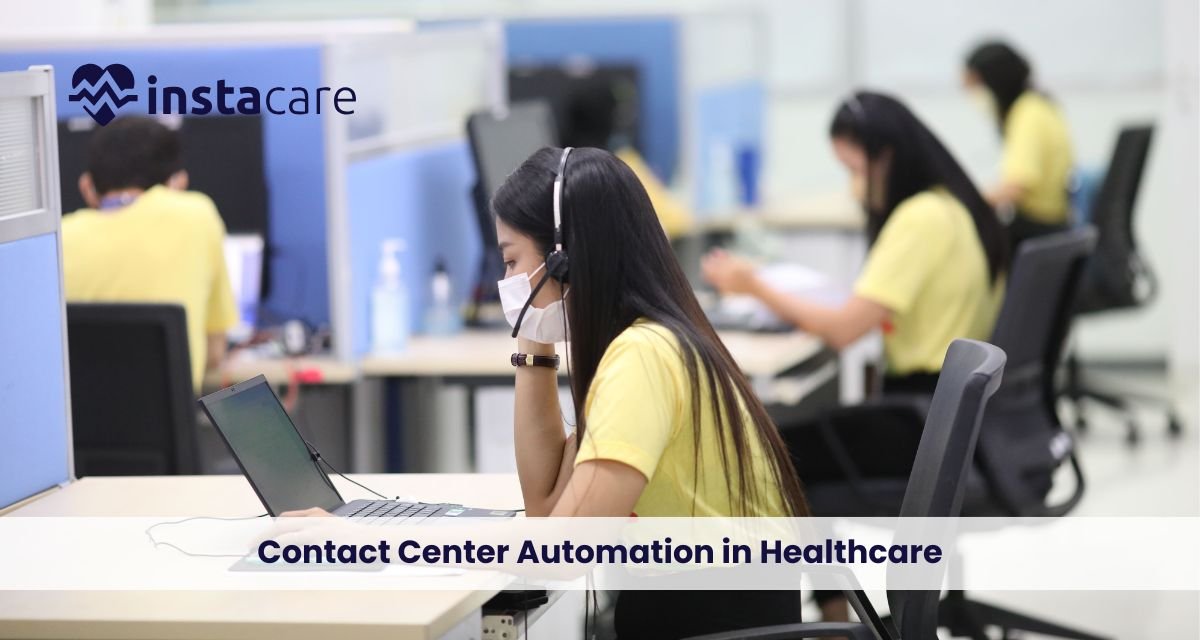Last updated on Friday, 3, October, 2025
Table of Contents
Contact Center Automation in Healthcare: Enhancing Patient Experience and Operational Efficiency
The healthcare industry is experiencing a record transformation with the emergence of digital technology and patient-centric care models. Under such circumstances, contact center automation in healthcare has emerged as a strong measure to rationalize patient communication, check operational inefficiencies, and improve overall experience.
Hospitals and clinics are spending increasingly on online platforms and automated technologies in order to respond to the growing demand for speedier, improved quality medical services. This strategy not only maximizes patient satisfaction but also enables health professionals to use resources optimally.
What is Contact Center Automation?
Contact center automation refers to the application of artificial intelligence (AI), machine learning, and digital technology to handle and automate the communication between patients and healthcare professionals. The operational disadvantages of call centers are high hold times, high call volume, and human errors.
Automations handle these by leveraging sophisticated systems like contact center AI chatbots for healthcare, automated voice response systems, and converged systems to carry out tasks like appointment setting, prescription refill, and answering FAQs.
Why Does Healthcare Need Contact Center Automation?
Healthcare professionals practice in a context where time and precision are of the essence. Latent patient communication and inept handling of questions affect health outcomes and erode trust in healthcare systems. Healthcare call center automation solutions are needed since hospitals and clinics can handle high call volumes without sacrificing the quality of service. Further, automated support is available 24/7, and this is more crucial for patients who need instant guidance.
The second major reason is increasing pressure for personalized medicine. Patients expect to have smooth interactions, either to book appointments, obtain medical information, or follow up. AI in healthcare contact centers provides instant responses and appropriate information to every patient without overburdening healthcare professionals.
Applications of Contact Center Automation in the Healthcare Industry
● Appointment Scheduling
One of the greatest successes in implementation is appointment contact center automation for appointment scheduling. Automated procedures enable patients to schedule, reschedule, or cancel an appointment through voice assistants, chatbots, or web portals. This minimizes reliance on human personnel while providing patient convenience.
● Patient Communication
Patient communication automation provides timely reminders for vaccine schedules, lab test results, follow-up visits, or medication. Automated reminders minimize no-shows and enhance treatment adherence.
● Billing and Insurance Queries
Automation can give real-time feedback by the minute on billing, insurance, and payment schedules without administrative hassle and confusion.
● Multi-Channel Communication
Healthcare contact centers today deploy omnichannel automation in healthcare contact centers for communicating with patients via call, SMS, email, mobile app, and web chat. The common platform provides the same experience through every channel.
● Emergency Triage Support
Automaton software is also capable of sorting and prioritizing patient questions right away, marking the same as priority for the medical staff to address promptly.
● Workflow Management
Contact center workflow automation in healthcare eliminates tasks like updating patient records, handling insurance information, and call routing to the right department.
Benefits of Contact Center Automation
● Lower Waiting Times
Among the major Benefits of contact center automation in healthcare is minimizing reducing wait times with healthcare contact center automation. The patients no longer have to wait for long on the telephone; automated software gives the solution forthwith or connects them to the appropriate individual.
● Operational Efficiency
Contact center automation and healthcare efficiency go hand in hand because automation reduces human error, manual repetitive tasks, and improves employees’ productivity.
● Improved Patient Experience
Through real-time feedback and one-to-one conversations, contact center automation and patient experience are greatly enhanced. Patients appreciate being treated with dignity and respect during their medical experience.
● Cost Savings
Automation eliminates the need of big call center staff, reducing the cost of operations while still maintaining high-quality service.
● Better Resource Utilization
With repetition handled by automations, healthcare professionals enjoy the luxury of dealing with more urgent matters such as direct patient care.
● Data-Driven Insights
Reports and analytics from automated systems assist organizations in grasping the needs of patients, recognizing bottlenecks, and enhancing services.
● Scalability
Hospitals can scale contact center automation software in healthcare with ease and grow in demand by scaling to serve more patient inquiries without making enormous infrastructure investments.
Book Your Free Marketing Consultation
Challenges & Considerations
While the advantages of contact center automation to the healthcare sector are wide-reaching, there are challenges:
- Data Security and Privacy: Keeping sensitive patient data secure is of top priority while implementing automation.
- Interfacing with Other Systems: Some of the hospitals have already implemented Electronic Health Record (EHR) systems, so interfacing with new solutions being challenging.
- Human Contact vs. Automation: Certain patients like to have a human touch, particularly for sensitive medical matters.
- Implementation Cost: Training and installation do come with cost and time, and this could be a dilemma to smaller health organizations.
- Regulatory Compliance: Software utilized in automations needs to comply with healthcare regulations like HIPAA or GDPR to safeguard patient confidentiality and safety.
Future of Contact Center Automation in Healthcare
The future of contact center automation in healthcare looks promising, with artificial intelligence and machine learning becoming more critical factors. Predictive analysis will enable providers to predict patient needs in advance, while voice recognition software will enable more human-like and natural communication. Telemedicine platforms will be coupled with automation, with seamless digital healthcare ecosystems being created.
There will be additional intelligent triage systems, sophisticated sentiment analysis, and preventive patient engagement programs facilitated by emerging technologies. Contact centers will be smart centers as a consequence, where automation harmonizes with human smartness to deliver quality patient care.
Conclusion
Healthcare is a sector where smooth functioning and effective communication are given utmost priority. Automated health care call center solutions do not only automate patient interaction to contact center workflow automation in healthcare, lower expenditures, and boost the level of patient satisfaction as well. Be it automating patient communication or automating health care contact center processes, software automation is revolutionizing hospital operations.
Though there are disadvantages, the advantages in the long term outweigh them. With developing AI for healthcare contact centers, the health industry will see improved service delivery and patient experience even more significantly. The future lies in accepting automation as an ally in delivering patient-centered care.
FAQs
1. How is contact center automation advantageous to patient care?
Contact center automation also improves patient care by reducing waiting time, 24/7 customer support, reminder calls to attend appointments and take medicine, and prioritizing emergency cases on time.
2. What are the main contact center automation solutions for hospitals?
The most popular contact center automation solutions for hospitals are AI chatbots, automated voice assistants, workflow management systems, omnichannel communication platforms, and appointment scheduling systems.
3. Is contact center automation a substitute for human staff?
Automation is never a substitute for human staff but to assist them. It takes over routine and time-consuming processes, freeing medical staff to deal with high-level, sensitive, or critical cases.
4. Is automation secure for patient data?
Actually, if done appropriately. Health care organization contact center automation software needs to be HIPAA and GDPR compliant for secure and confidential handling of patient information.



